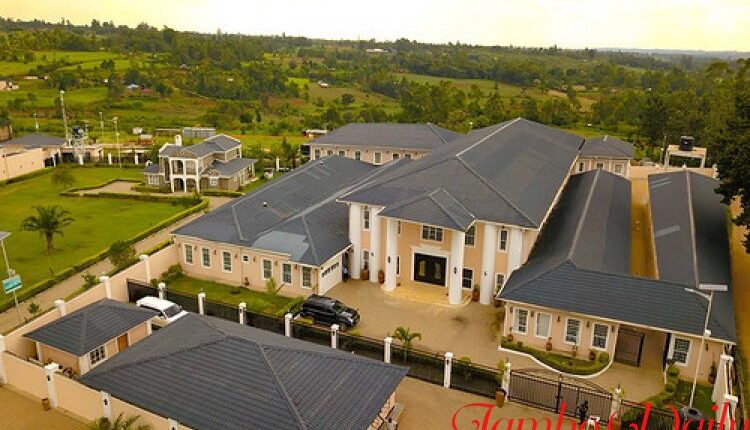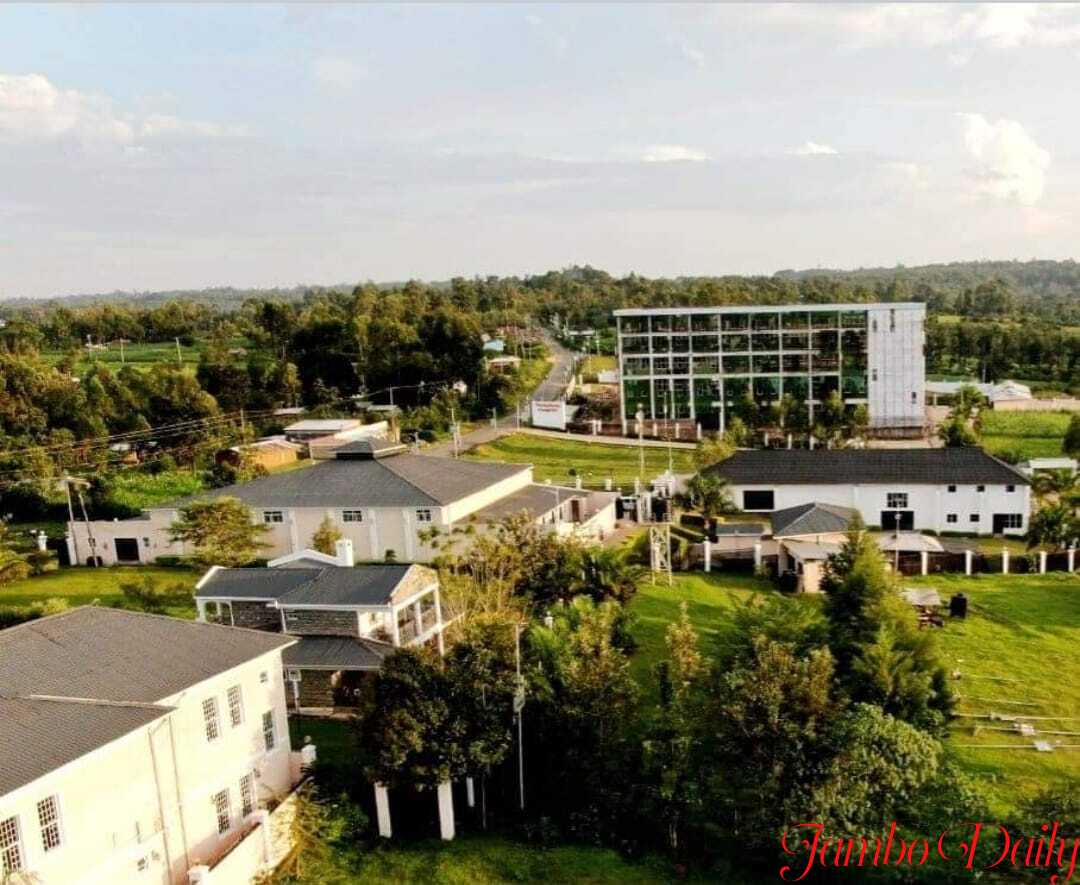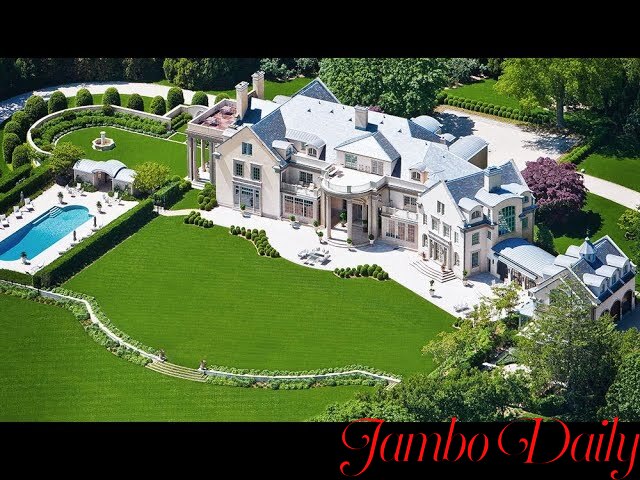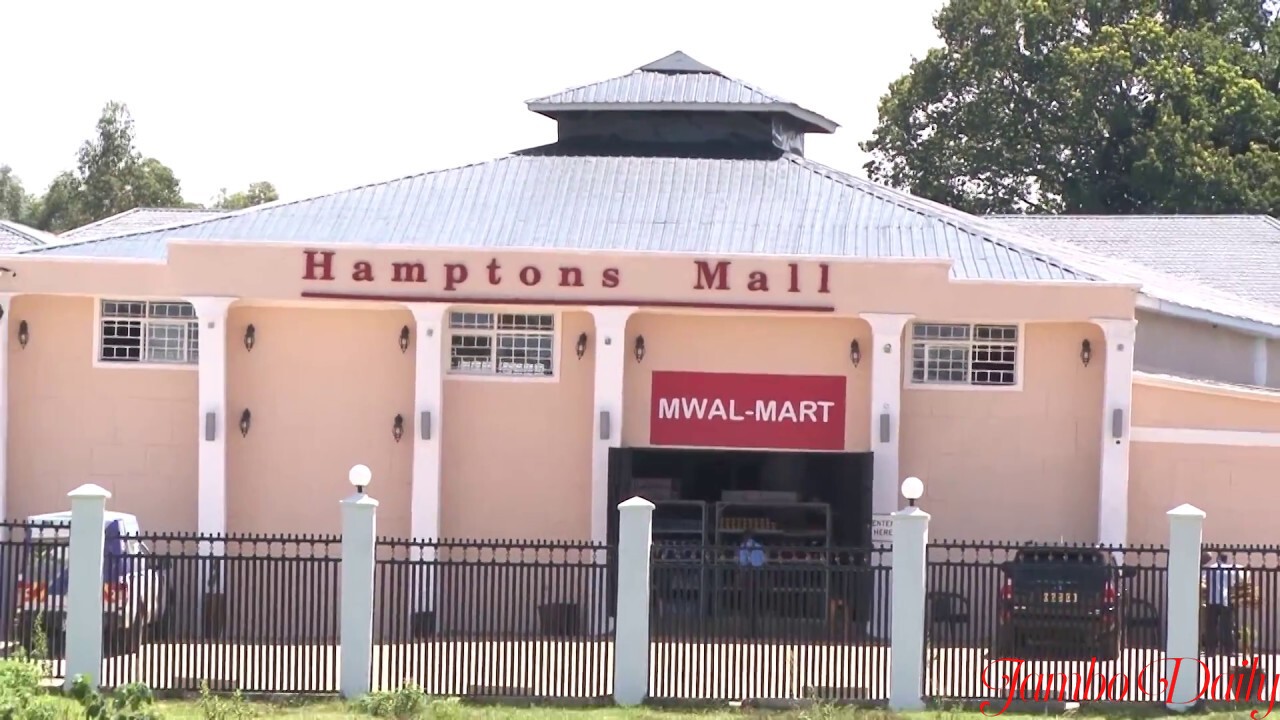
The Mwale Medical and Technology City, a Total Scam or Success?
In Kenya’s Butere Sub-county of Kakamega, there is a community-owned sustainable metropolis called Mwale Medical and Technology City. It is built around a huge medical complex that includes the Hamptons Hospital, which can accommodate 5,000 patients, and a research and innovation park in the Plaza neighborhood.
Julius Mwale, a Kenyan technology entrepreneur and investor located in the United States is said to be the man behind the big project.
Mwale Medical and Technology City has an estimated cost of $2 billion USD and is being built in three phases divided into five districts: Plaza, Golf, Grid, Airport, and Industrial. Its construction began in 2014.
The construction of the 5000-bed Hamptons Hospital, a 36-hole golf course, a 10MW solar plant, 3500 solar streetlights, and a shopping mall called Hamptons, round out the tourist attractions in the area. There is also round-the-clock security.
The Hamptons Hospital

The Hamptons Hospital, which cares for patients receiving treatment for cancer and other illnesses, is located in the heart of this large metropolis. The largest hospital in the world would eventually be built in Hamptons, claims lead investor Julius Mwale.
With cutting-edge tools, it will cover every facet of healthcare. If they have a reference from the Kakamega General Hospital, residents of Kakamega County would receive free care. Since its founding, both inhabitants and visitors to the facility have expressed their admiration for the city.
Superstar Senegalese-American Akon has teamed up with MMTC to provide citizens and companies with digital financial services through Akoin.
The Female Quotient (FQ), which will soon open the FQ Equality Co-Lab in the center, is one of the world’s top businesses that have invested in Mwale Medical and Technology City.
Mwale Medical and Technology City faces Criticism
Despite all the praises and admiration, the City has faced criticism and badmouthing from various parties in equal measure. Scandals and controversies have rocked the project, with many of the City’s critics questioning the legitimacy of the project and its real owner. They have also questioned the real motive behind its establishment with some claiming the founders of the city have a hidden agenda.
In 2018, The Standard Media reported that the facility was caught up in a controversy row with the Kakamega County Government whose officials claimed that the founders had not followed the due procedure when establishing the city.
The county had threatened to destroy the multi-billion shilling development, claiming that it had never granted the investor permission to proceed and that he had broken multiple rules.
The investor, according to county officials at the time, had broken several laws, including the County Government Act, which provides a framework for county planning, the County Land Registration Act, the Public Health Act on Housing and Sanitation, and the Kakamega County Physical Planning Act, which mandates that the county control developments within its jurisdiction.
The county further charged the investor with disregarding a requirement for public input prior to starting such a project.
To prevent the county and Lands Executive Alfred Matianyi from posting advertisements or notices of the project’s demolition, which the investor, Tumaz and Tumaz Enterprises, claimed had already cost Sh14 billion, the firm went to court.
The investor filed an urgent petition with the High Court and won a gag order prohibiting any corrective action on the project.
Mr. Matianyi and the county government were given a directive by high court judge RN Sitati not to issue demolition notifications in any national newspapers.
Development has since resumed on the project and as of 2022, the city has taken shape, with most of the work complete. The Ksh 200 Billion facility now houses more than 35,000 people and has over 2,000 employees.
Read Northlands City: Inside Ksh 500 Billion Kenyatta Family Project.
Mwale Medical and Technology City Controversy on Twitter

A Twitter user by the name of Saddique Shaban seems to be on the neck of the entire city and its management. For over 5 years now, he has been releasing an array of tweets criticizing the city’s founder Mr. Julius Mwale, the hospital management, and the founders of the Tech City.
According to Saddique, Mwale is a fraudster investor who formerly served as a Kenya Air Force soldier but fled the country in 2000 seeking asylum in the United States after a skirmish with top Government officials at the time. It is believed that he fled the country fearing for his life.
Who is Julius Mwale?
On the other hand, information in the public domain describes Mwale as a US-based Kenyan investor who founded Mwale Medical and Technology City. Further reports indicate that Julius Mwale has been at the vanguard of the global technological revolution for many years.
The billionaire, who was born in Kenya, lives in New York City and is surrounded by some of the richest and most powerful individuals in the world, including Bill Gates, George Soros, and former US President Donald Trump.
It is believed that living among these great minds fueled his dream and motivation to establish such a large business entity in a rural village in Kenya. The reason why he chose the location remains unclear.
But according to Saddique, this is pure blackmail and hot air. The blogger claims that a group of powerful individuals are behind the mega investment and are using Julius Mwale as their proxy.
He claims on his Twitter thread that the group engages in illegal business which includes fraud and channels the proceeds to the investment in order to hide their shady deals. He alleges that the facility was founded to aid the billionaire fraudsters to engage in money laundering activities and keep their names clean.
Saddique Shabaan on Mwale Medical and Technology City
In one of his numerous tweets, the blogger had written ” Where did Julius Mwale get KSh. 2,000,000,000 (US $2 billion) for his Mwale Medical and Technology City as claimed? I haven’t seen any credit reference materials on his alleged worth, or his company’s Tax return fillings..”
“Julius Mwale continues to make astonishing claims about his MMTC, whose foundation stands on controversial grounds. No one in the national government has challenged this man over his suspicious and fraudulent reputation over this project.” Wrote Saddique in a different tweet.
The Media on Mwale Medical and Technology City
The mainstream media had earlier produced videos and articles explaining the rise of MMTC, including a youtube video by K24 TV. The videos explained details of how the city was founded and how it came to reality with the efforts of a group of investors dubbed Mwale and Co.
Saddique contradicts the stories in the media claiming that the media outlets had pulled down their posts after fresh details emerged on the real story behind the investment. He alleges that the media was corrupted to fabricate stories on the Mwale Medical and Technology City. He however does not provide information or links to the fresh details he claims to have emerged, which places doubt on his legitimacy.
A further spot-check by this website however shows that indeed some of the posts have been pulled down from the media websites. However, it is not known whether the posts were pulled down due to the controversy surrounding the whole ordeal or for reasons better known to the Media giants.
Mwale City Land Grabbing Case

In February 2018, Julius Mwale was in the spotlight over claims of grabbing Butere Girls’ High School land. He was accused of conspiring to take the land away from the institution and use it for private investment.
However, Mwale came out to defend himself by explaining that his aim was not to grab the land but to give Ksh 85 million out of the Ksh 150 million for Canon Awori Memorial Cathedral at Butere ACK diocese. (The land in question)
The star newspaper had posted an article on this issue on their website, however, the article seems to have been pulled down five years down the line. This raises more questions about the whole issue, putting on some weight on the blogger’s claims. But no significant answers can be drawn from this one instance.
But what is really the problem with Mwale City? Why does it keep facing opposition and criticism including from the county government while it seems to be uplifting the community around? Why are some people concerned about the source of funding for the project and why is it significant to scrutinize this investment?
A simple interpretation of the fraud claims to this investment would be that after storming out of the country, Mwale met a group of investors who were willing to invest in a developing country. Since he was predominantly from Kenya, he might have shared with them the idea of investing in Kenya, which they could have accepted.
As a sign of goodwill and giving back to society, Mwale might have chosen to direct the project to his rural constituency of Butere in Kakamega. He might have convinced the investors why Butere was the best location and why they needed to invest in such a place. The team could have then joined hands to put up the project.
What comes out clearly is that this is not a single-person investment but a project brought up by a team of investors with strong financial backgrounds and knowledge about real estate investment. Alternatively, they could have outsourced the information and skills required to put up the project since they already had the financial capacity. As they say, great things happen when people come together.
As for the fraud allegations, no one really knows the source of funding for this project other than what has been presented by the founders which is a partnership.
Conclusion
Although Sadiqque and other critics have raised endless questions over funding and the real motive behind the project, none of them have presented solid evidence for their claims. Probably if they did, Kenyans would believe them. If any of them has evidence of their claims they should probably move to court and testify against the investors.
The question of fraud can however not be ruled out completely but note these are just allegations that can have serious repercussions on the critics if they are sued for defamation. Therefore, solid evidence is the way to go.
In any case, after the claims were made in 2018, the company was cleared to continue with its investment. Today, the city is fully operational with a population of over 35000 people. Many Kenyans have also secured job opportunities from the company, which is a benefit to the community.
The government is also fully aware of the company’s operations and has allowed it to continue. Therefore, until a case is presented in court against the investment along with solid evidence, this discussion shall go on, and no conclusive agreement will be arrived at.
And so the question remains, Who is telling the truth among all these parties?
